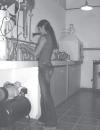Abstract
It's presented, initially, the causes that determine the advent of the conservation science only some time after the awakening of the preservationist conscience. It's established that this scientific knowledge is vital in the conservation of the material that forms the artifacts of cultural interest. It shows, secondly, the first European movements towards the scientific conservation of works of art and the main protagonists of this movement. After that it's approached the systematic formation of the conservators-restaurateurs in Brazil and how it's been developed up to now, emphasizing the role of the investigation in this formation. It's also emphasized the important role that the universities may play, especially in developing countries. To exemplify, it's pointed out the role that the NTPR (Núcleo de Tecnologia da Preservação e da Restauração) from the Federal University of Bahia has been performing in its Post Graduate program in restoration and conservation of monuments and historic sites.Apuntes is registered under a Creative Commons Attribution 4.0 International Public License. Thus, this work may be reproduced, distributed, and publicly shared in digital format, as long as the names of the authors and Pontificia Universidad Javeriana are acknowledged. Others are allowed to quote, adapt, transform, auto-archive, republish, and create based on this material, for any purpose (even commercial ones), provided the authorship is duly acknowledged, a link to the original work is provided, and it is specified if changes have been made. Pontificia Universidad Javeriana does not hold the rights of published works and the authors are solely responsible for the contents of their works; they keep the moral, intellectual, privacy, and publicity rights.
Approving the intervention of the work (review, copy-editing, translation, layout) and the following outreach, are granted through an use license and not through an assignment of rights. This means the journal and Pontificia Universidad Javeriana cannot be held responsible for any ethical malpractice by the authors. As a consequence of the protection granted by the use license, the journal is not required to publish recantations or modify information already published, unless the errata stems from the editorial management process. Publishing contents in this journal does not generate royalties for contributors.


